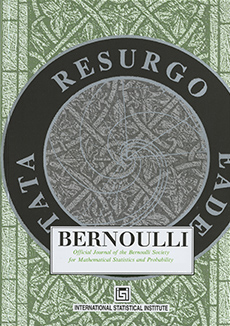Abstract
We study the usual stochastic order between probability measures on preordered topological abelian groups, focusing on asymptotic and catalytic versions thereof. In the asymptotic version, μ dominates ν if the i.i.d. random walk generated by μ first-order dominates the one generated by ν at late times. In the catalytic version, μ dominates ν if there is a third measure τ such that the convolution first-order dominates . Provided that the preorder on G is induced by a suitably large positive cone and that both measures are compactly supported Radon, our main result gives a sufficient condition for asymptotic and catalytic dominance to hold in terms of a family of inequalities closely related to the cumulant-generating functions. While this sufficient condition requires these inequalities to be strict, the non-strict versions of these inequalities are necessary. This result has been known for , but is new already for with . It is a direct application of a recently proven theorem of real algebra, namely a Vergleichsstellensatz for preordered semirings. We finally use our result to derive a formula for the rate at which the probabilities of a random walk decay relative to those of another, now for walks on any preordered topological vector space with compactly supported Radon steps. Taking one of these walks to be deterministic reproduces a version of Cramér’s large deviation theorem for infinite dimensions.
Acknowledgments
We thank Richard Küng, Rostislav Matveev, Luciano Pomatto, Matteo Smerlak, Arleta Szkoła, Omer Tamuz and Péter Vrana for useful discussions and feedback, as well as David Handelman and Terence Tao for discussion on MathOverflow. Part of this work has been conducted while the author was with the Max Planck Institute for Mathematics in the Sciences and later with the Perimeter Institute for Theoretical Physics, both of which we thank for their outstanding research environments.
Citation
Tobias Fritz. "Characterizing the asymptotic and catalytic stochastic orders on topological abelian groups." Bernoulli 30 (4) 2932 - 2954, November 2024. https://doi.org/10.3150/23-BEJ1700
Information





